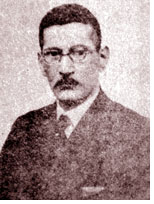Shūmei Ōkawa
| Shūmei Ōkawa | |
|---|---|

Shūmei Ōkawa
|
|
| Born |
December 6, 1886 Sakata, Yamagata, Empire of Japan |
| Died | December 24, 1957 (aged 71) Tokyo, Japan |
| Cause of death | cardiac asthma |
| Nationality | Japanese |
| Education | Tokyo Imperial University, 1911, Ph.D. 1926 |
| Occupation | Educator, Political philosopher, Islamic scholar, historian |
| Employer |
|
| Known for |
|
| Criminal charge |
|
| Criminal status | International Military Tribunal for the Far East dropped charges |
| Children | none |
| Parent(s) | Shūkei Ōkawa, physician (d. 1914) |
| Notes | |
Shūmei Ōkawa (大川 周明 Ōkawa Shūmei?, December 6, 1886 – December 24, 1957) was a Japanese nationalist, Pan-Asian writer, indicted war criminal, and Islamic scholar. In the prewar period, he was known for his publications on Indian philosophy, philosophy of religion, Japanese history, and colonialism. He is frequently called a "right-wing" writer, although he described himself as anti-capitalist and rejected the label "right-wing."
Ōkawa was born in Sakata, Yamagata, Japan in 1886. He graduated from Tokyo Imperial University in 1911, where he had studied Vedic literature and classical Indian philosophy. After graduation, Ōkawa worked for the Imperial Japanese Army General Staff doing translation work. He had a sound knowledge of German, French, English, Sanskrit and Pali.
He briefly flirted with socialism in his college years, but in the summer of 1913 he read a copy of Sir Henry Cotton's New India, or India in transition (1886, revised 1905) which dealt with the contemporary political situation. After reading this book, Ōkawa abandoned "complete cosmopolitanism" (sekaijin) for Pan-Asianism. Later that year articles by Anagarika Dharmapala and Maulavi Barkatullah appeared in the magazine Michi, published by Dōkai, a religious organization in which Ōkawa was later to play a prominent part. While he studied, he briefly housed the Indian independence leader Rash Behari Bose.
...
Wikipedia
